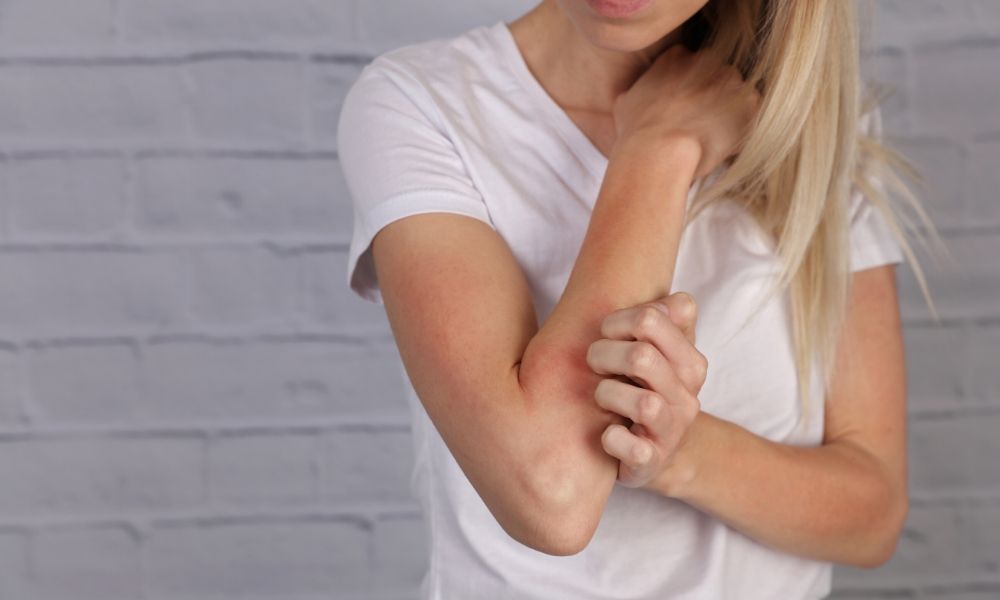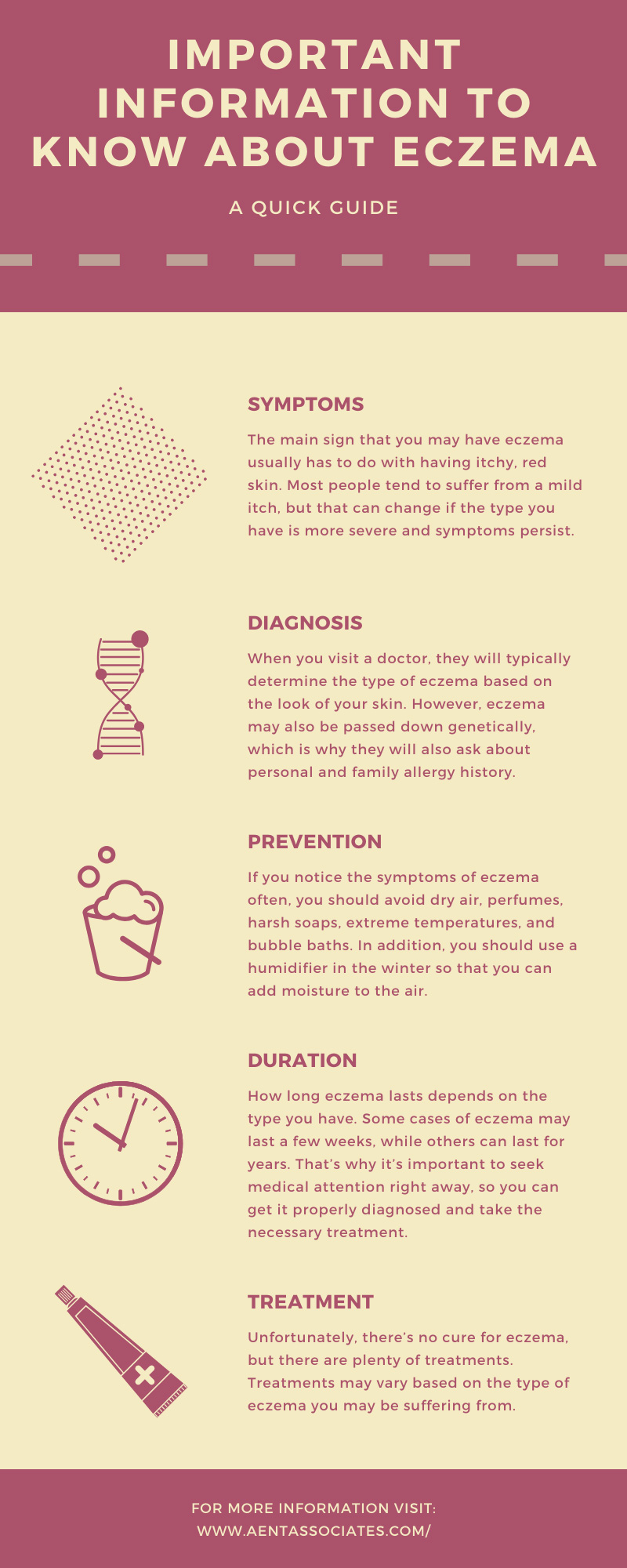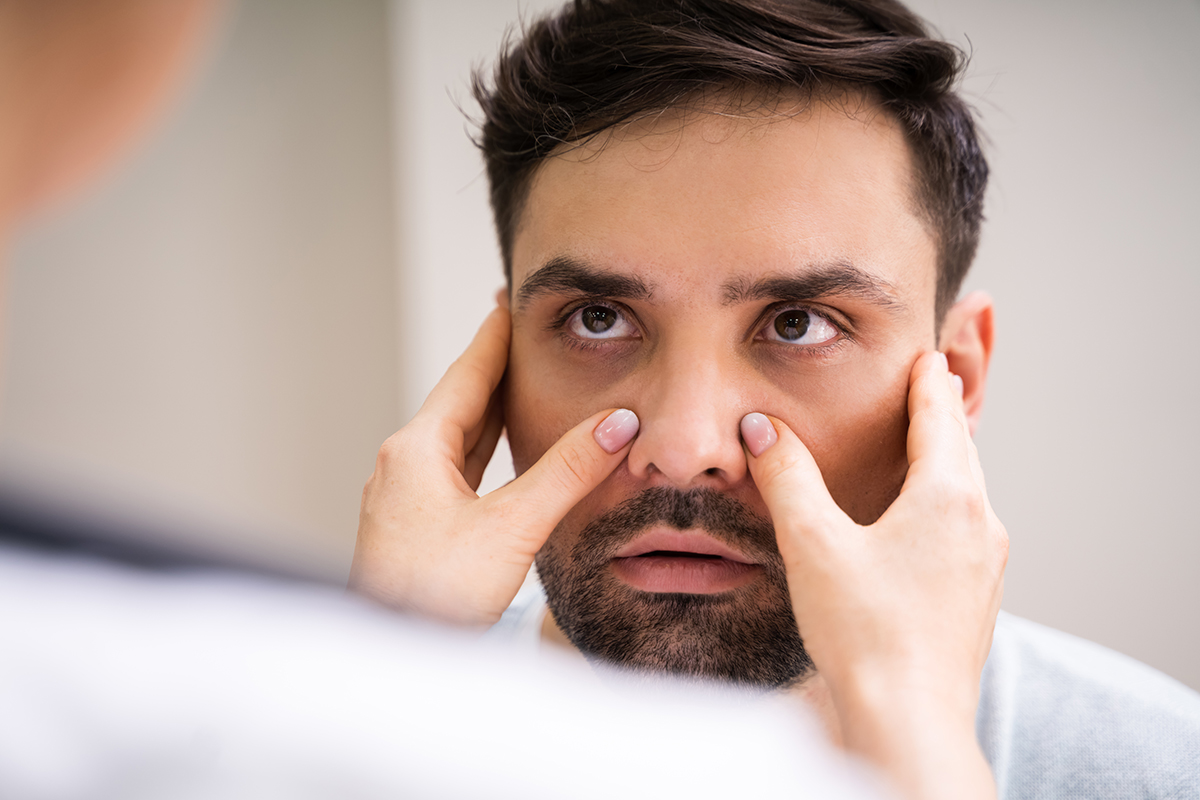
Our skin, the largest organ, is exposed to many elements and irritants that can cause damage to it. Many people commonly experience red, itchy skin and other symptoms on occasion, but some conditions stick around longer than others. Eczema is just one condition that refers to these skin issues, and it occurs in everyone from babies to the elderly. For more important information to know about eczema, we created a comprehensive guide on the different symptoms, types, treatments, and more.
Symptoms
The main sign that you may have eczema usually has to do with having itchy, red skin. However, there may be a difference with how it looks on a child or an adult. Someone may also have a different stage of eczema. Most people tend to suffer from a mild itch, but that can change if the type you have is more severe and symptoms persist. Some symptoms you may experience include:
- Dry, sensitive skin
- Red, inflamed skin
- Bad itching
- Rough, leathery, or scaly patches of skin
- Oozing or crusting
- Areas of swelling
Types
There are various types of eczema that you know, so you can better understand your body and what might have caused the condition. There’s also a chance that you may suffer from more than one type of eczema at a time. That’s why it’s important to understand the different types of eczema out there, and we list them below.
- Atopic dermatitis: This occurs in babies that are 18 months old, and it typically affects the neck, ears, torso, the top of feet, and outside the elbows. While atopic dermatitis is common in babies, it can still happen to older children, teenagers, and adults. It usually occurs inside the skin creases of the elbow, knee, upper eyelids, ankle, wrist joins, and hands. Atopic dermatitis will typically happen to people who inherently suffer from allergies.
- Contact dermatitis: This type of eczema causes inflammation after the skin is exposed to a substance, or there may be an allergic reaction associated with it. It’s one of the uncommon symptoms of an allergy that people don’t know to watch for. Multiple substances may cause skin irritation, which includes cosmetics, soaps, shampoos, laundry detergents, fabric finishes, antibiotic ointments, perfumes, metal jewelry, and industrial solvents. There are also things you do daily, such as washing your hair, wearing a diaper, or hiking near poison ivy, that may cause this eczema type.
- Dyshidrotic eczema: A deep-set of blisters will occur on fingers, palms, toes, and the soles of feet that will result in itching, redness, flaking, and cracked skin. Some causes of dyshidrotic eczema include pollen, stress, moist hands, nickel and cobalt in foods, and chromium salts.
- Nummular eczema: This eczema type can be identified by the small patches of irritated skin you may find on one’s legs, chest, and arms. Nummular eczema is a type normally found in adults.
- Seborrheic dermatitis: For infants, this type of eczema occurs on the scalp. In adults, seborrheic dermatitis will appear like dandruff, but it can also happen on the face, neck, scalp line, and around the nose.
- Stasis dermatitis: When people suffer from improper vein function in the legs, they many start to notice stasis in the feet, calves, and ankles. Itching, red bumps, leg swelling, skin redness, and weeping sores are all signs of stasis dermatitis.
- Asteatoic eczema: This eczema is common as you get older, and it will cause dry skin and cracks. Asteatoic eczema will first start in the lower legs, and it usually occurs during the winter when you spend a lot of time indoors.
- Hand eczema: Exposure to detergents, washing hands excessively, or an allergy can lead to hand eczema. This type of eczema only happens on the hands, hence it’s exclusive name.
- Lichen simplex chronicus: If you continue to scratch or rub your skin, it can result in lichen simplex chronicus. This eczema will can cause thick, discolored skin if the habit persists. Bumps can occur if one continues to pick at their skin.
Diagnosis
When you visit a doctor, they will typically determine the type of eczema based on the look of your skin. However, eczema may also be passed down genetically, which is why they will also ask about personal and family allergy history. Eczema may also be caused by coming into contact with chemicals or plants that may cause an allergic reaction. If an allergist suspects the cause may be due to an allergy, then they will perform additional tests. One option is allergy patch testing.
Prevention
You can take a few preventative measures to avoid eczema. If you notice the symptoms of eczema often, you should avoid dry air, perfumes, harsh soaps, extreme temperatures, and bubble baths. In addition, you should use a humidifier in the winter so that you can add moisture to the air. It’s also recommended that you use cotton-made blankets and clothing. Another tip is to pat the skin dry with a towel after taking a shower or bath instead of rubbing. If you’re susceptible to contact dermatitis, you should avoid encountering plants, jewelry, detergents, and other things that may exacerbate your skin allergies. Since stasis dermatitis occurs in the legs, wear compression stockings and elevate the leg if you will lie down for a long period of time.
Duration
How long eczema lasts depends on the type you have. Some cases of eczema may last a few weeks, while others can last for years. That’s why it’s important to seek medical attention right away, so you can get it properly diagnosed and take the necessary treatment.
Treatment
Unfortunately, there’s no cure for eczema, but there are plenty of treatments. Treatments may vary based on the type of eczema you may be suffering from, but some common ones include:
- Over-the-counter remedies
- Phototherapy
- Prescription topical medications
- Immunosuppressants
- Biologic drugs
- Natural treatments
A visit to a doctor after suffering from symptoms of eczema like red, itchy, cracked, or dry skin can lead you toward the appropriate treatment you will need. As the top allergists in Houston, TX, Allergy & ENT Associates can determine the best treatment for your specific eczema type. Make an appointment at one of our 18 locations today to learn about getting some relief.




